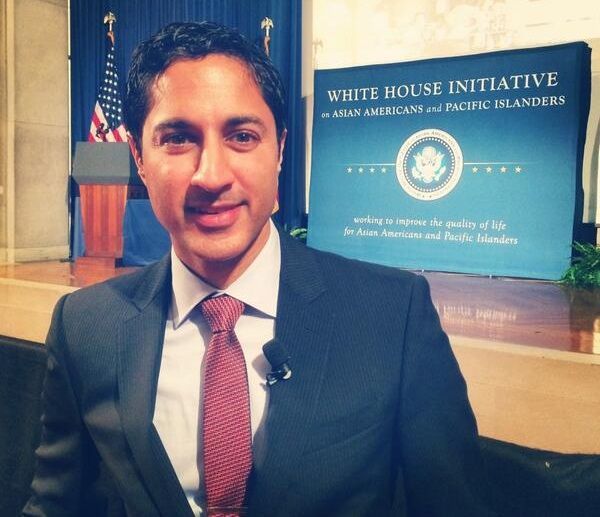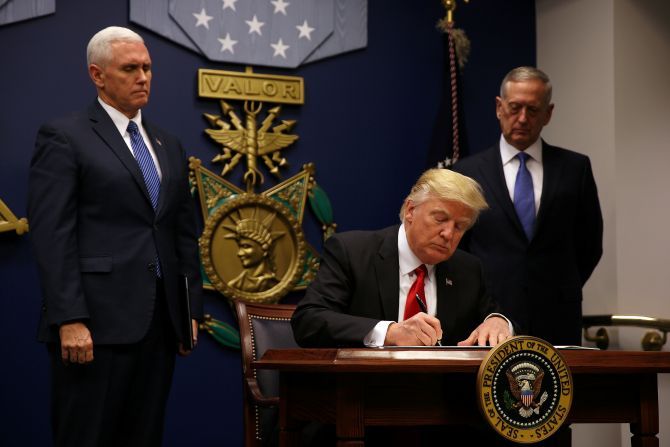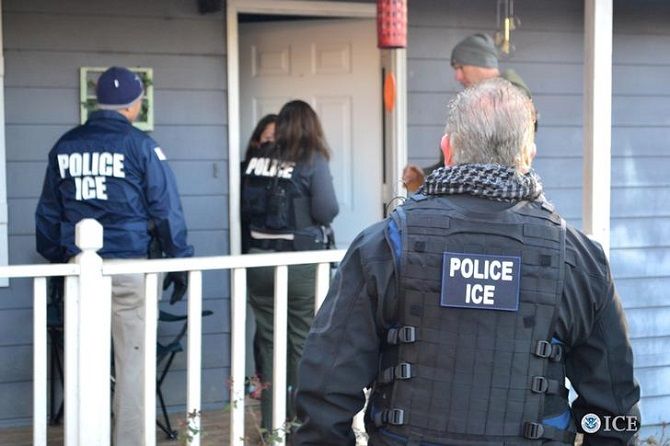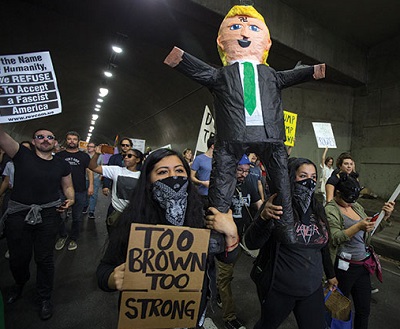'Having a voice at the table means the other side has to show up to listen. It became clear that wouldn't happen,' says actor Maulik Pancholy, one of the 10 members who resigned this week from the US president's advisory commission on Asian Americans.
'As the son of immigrants, as a person of colour, and as a married gay man,' he tells Rediff.com's Monali Sarkar, 'I feel like so many of the hard won rights that so many people have fought for -- for decades -- are at the risk of being dismantled.'

In the wake of United States President Donald Trump's policies, the president's advisory commission on Asian Americans and Pacific Islanders (AAPIs), which works to improve the quality of life and opportunities for AAPIs by facilitating increased access and participation in federal programmes where they remain under served, received a significant blow on February 15.
Ten members of the commission, including the chair and co-chair, submitted their resignations to Trump, saying, 'Although the commissioners' term ends 9/30/17, we can no longer serve a President whose policies aim to create outcomes that are diametrically opposite to our principles, goals, and charge.'
Six other commissioners -- including Indian-American Democratic political activist Shekar Narasimhan -- had resigned in January. This leaves the commission with only four members for now.
The Letter
In the letter to Trump, the commissioners noted that they had earlier written to Trump 'stating the goals and principles that defined our work as Commissioners', but had received no response.
They said that under Presidents Clinton, Bush, and Obama, the commissioners had been responsible for helping the federal government better serve AAPIs.
They said that the principles fundamental to their work were protecting the civil rights of all those living in 'our country, including the most vulnerable; respecting the unique attributes of all individuals and communities; promoting family values by keeping families together and reuniting those separated by immigration; and ensuring linguistic, cultural, and financial access to health care as well as economic and educational opportunities for all.'
'Since your Inauguration,' the commissioners told Trump, 'the Executive Orders you have issued and policies you promulgated have greatly impeded the ability of the federal government to serve all who live here.'
They listed the 'deleterious consequences' of Trump's actions 'for AAPIs and for all Americans' -- the proposals to cut federal resources to sanctuary cities, bans on refugees and those coming from the seven predominantly Muslim countries, the idea of building a wall between Mexico and the US, and repealing the Affordable Care Act, which has benefitted 20 million previously uninsured AAPIs.
They also objected to Trump's 'portrayal of immigrants, refugees, people of colour and people of various faiths as untrustworthy, threatening, and a drain on our nation.'
'Among the Commissioners,' they said, 'there are immigrants, refugees, and descendants of those who have experienced systematic discrimination. We, and the communities that we represent, have worked diligently to make America great and have fought to keep it free. We have and will always strive to ensure that America, our America, will never go back to the days of exclusion, segregation, and internment -- all policies which have severely impacted AAPIs.'
Among those who resigned this week were Indian-American actor Maulik Pancholy, who starred in 30 Rock and Weeds, and will soon be seen on Star Trek: Discovery.
'Protecting civil rights and fighting against bullying were pillars of our commission's work. We cannot serve under an administration that seeks to exclude members of our society or take away their rights, especially the Muslim community, which is very much part of our AAPI community,' he said in a statement.
Pancholy, who was appointed to the commission in 2014, had stayed on the commission after the first round of resignations in recognition of the importance of having a seat at the table to bring up issues 'important to our community.'
In an email interview with Rediff.com, he explains why he no longer wants to sit at that table, why the AAPI advisory commission was so important for immigrants, and why, as things stand, he will be able to do more from the outside.

It has been a tough few months since November 8. As a son of immigrants, as a person of colour, as a man who was able to marry the man he loved thanks, in part, to the policies of the earlier administration, what have you felt, what have you gone through in these past few months?
Personally, it's been quite an emotional time.
I remember feeling cautiously optimistic after Trump's very first meeting with Obama, where he seemed tempered.
But since then, most everything I feared has come to the foreground in terms of his cabinet picks, his push to repeal the ACA, the Muslim ban, his negative characterisations of immigrants, the anti-abortion executive order, and the deeply worrying things that are coming out in terms of LGBT rights, including the potential for a 'religious freedom' executive order. And I could go on.
As the son of immigrants, as a person of colour, and as a married gay man, I feel like so many of the hard won rights that so many people have fought for -- for decades -- are at the risk of being dismantled.
What drew you to the President's Advisory Commission on AAPIs?
What was it about the commission that made it so important to you, that makes it so important for immigrants?
The Commission was an incredible opportunity to be of service and to give back to our communities.
It was the chance to take people's concerns to the federal government, relay ways the government was already meeting needs and make sure our communities had access to those programmes, and to fill in the gaps where the government could be doing better.
Our role as commissioners was, in a way, to bring the federal government to the people, and bring the voice of the people back to the federal government.
Commissioners came from all over the country, from all different career backgrounds, and represented the large Diaspora of AAPIs.
I believe in a government that is, as President Lincoln famously said 'of the people, by the people, and for the people.'
This was an opportunity to put that into practice, and I was grateful for it.
As an example of how this worked, I focused a great deal on anti-bullying and youth during my time on the commission.
We heard from several groups on the ground (The Sikh Coalition and The Asian American Legal Defence and Education Fund as just two examples) about the high rates of bullying among AAPI kids.
So, we conducted 29 listening sessions around the country to hear from young people, parents and teachers first hand what was really going on.
We formed an AAPI Bullying Prevention Task Force, out of which multiple departments at the White House came up with recommendations and commitments for what the government could be doing better.
We created a public awareness campaign called #ActToChange which brought existing resources such as stopbullying.gov to our communities, as well as making those resources more accessible to our communities by translating materials into multiple languages, spreading awareness on social media, engagement with AAPI celebrities, etc.
We also tried to address the areas in which AAPI kids were being bullied around religion, language proficiency, immigration status, physical appearance, LGBT issues, etc that needed to be dealt with in a way that was unique to our communities and wasn't already being met with existing materials.
Can you tell us about your experiences on the commission till January 20 and what came after -- not just in terms of Trump's policies, but also in terms of dealing with his administration?
Prior to January 20th, I feel like we had the means to make progress in areas such as civil rights, immigration, health care, language access, and cultural awareness.
Post January 20th, from my perspective, I haven't been able to effectively work from the inside.
We requested meetings with folks from the administration and have not received any response.
Further, the policies and rhetoric coming out of the White House are diametrically opposite to the views of the commission in a way that approaching our communities as a representative of the White House no longer aligns with my goals. And honestly, does not seem to align with the needs of my communities.
After six other commissioners resigned on January 20, you said that you stayed on 'to have a seat at the table to be able to bring up the issues that are important to our community.'
I am sure you knew it would not be easy. Even knowing that, were there things you encountered that left you shocked/shaken?
For me what has been shocking has been the lack of regard for vulnerable communities, the lack of respect for the equality of all individuals, the spike in hate crimes that we have seen, the fear and anxiety we are seeing around the country, and frankly all the lies that continue to come out of the White House.
The handling of the press has been horrifying.
The commission is an extremely tight group, and I know we will continue to be so.
Our differing perspectives is also our greatest strength.
Six of us felt, prior to the inauguration, that they wanted to resign their posts.
Now, 10 more of us feel like we can work more effectively to help our communities by being outside of the White House.
And four have stayed on to continue to try to work with the administration.
I have equal respect and admiration for every single one.
In the end, we all stay committed to fighting for the needs of our communities.
The decision to resign was obviously a result of various factors, but was there one thing/one incident that turned the tide for so many of you together?
For me, it's been an ongoing series of one thing after another that continued to go against my values, and the realisation that having a voice at the table means the other side has to show up to listen.
It became clear that wouldn't happen.
In my work on anti-bullying, I came to a point where I realised that I can no longer go to my community and ask how the federal government can help when the policies and rhetoric coming out of the White House have in fact made people distrust the government and created a culture of hate.
So, now I feel my work is best done fighting against those policies.

'If federal resources are cut to sanctuary cities... can you imagine the kind of hate and tension that could breed,' asks Maulik Pancholy.
'How does one know who was born here, who became a citizen later, who isn't a citizen now?'
Photograph: Bryan Cox/ICE
You were still on the commission when the immigration ban came into effect. What did you see around you? What were you feeling?
I live in Brooklyn close to the courthouse where Judge Donnelly initially blocked the ban.
So, what I saw was the incredible gathering of people of all colours, faiths, ages, genders and sexual orientations, coming together to stand up for what is right.
People rallying outside the courthouse for the beliefs this country was founded on.
I was proud to be a Brooklynite and a New Yorker that night.
In the following days, I witnessed and was a part of several other rallies, and I can tell you, it strongly influenced my decision to now work outside the government.
There is real power in the groups on the ground and a real need to stand up for the right things.
Among other things, the commissioners' letter to President Trump states that 'proposals to cut federal resources to sanctuary cities will fuel tensions between native-born Americans and immigrants -- regardless of their status.'
Can you please explain how it could even hurt documented immigrants?
I think part of it is perception.
I know post 9/11, many of my brown friends who were born in this country and are as patriotic as can be were targeted for the colour of their skin, or a perception that they were somehow just like the terrorists.
How does one know who was born here, who became a citizen later, who isn't a citizen now?
If federal resources are cut to sanctuary cities, and cities suffer as a result, can you imagine the kind of hate and tension that could breed?
And who might be targeted for the perception that they are the reason that funding has been cut?
A lot of your work at the commission focussed on anti-bullying initiatives. Do you see the actions of the present administration undoing that work?
Do you fear for children of colour, children of immigrants in schools?
Well, this is part of the reason I am no longer a commissioner.
I think I can better continue that work through groups on the ground and through state and local governments.
We have moved the #ActToChange campaign out from the umbrella of the White House so we can continue that resource as a grassroots effort supported by more than 60 diverse organisations.
We recently worked with the NYC department of schools to promote #ActToChange and make sure AAPI kids had the resources they needed during the NYC Schools Respect For All Week.
That's just one model of ways we're looking at to continue helping young AAPI kids dealing with bullying.
Trump's America

NYC Immigrant Affairs Chief:
I was in tears
Deepa Iyer:
Why Trump's immigration ban should worry Indians
Lakshmi Sridaran:
When they came for the Muslims, where were you?
Aseem Chhabra:
This American is worried
Arun Venugopal:
America in the Trump era and what desis must do
Mira Patel & Gautam Raghavan:
Trump is wrong for our community
Where do you go from here in terms of organising outside the White House?
All of the commissioners are continuing to engage in discussions about how we can stay connected and how we can be effective, and we are all committed to continuing to work for our communities.
Due to the rise of the far right, not just in America, but across the world much has been said about the liberals finding a way to talk to the conservatives, find a middle ground.
What is your take on that? Do you think it is possible, and if so how?
I do think it's possible. I think it's necessary.
I think, for everyone out there reading this, it can happen on a very personal level -- human beings connecting to each other and working to really understand each other. We need that now more than ever.
But I've also realised that there's a danger with this administration of waiting for a seat at the table.
There's a danger in normalising behaviours we've seen in this President -- the lies, the media bashing, the policies against immigrants, and let's not forget about the words he spoke that his own cabinet picks said constituted sexual assault.
I no longer want to wait to sit at that table.










